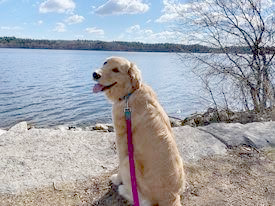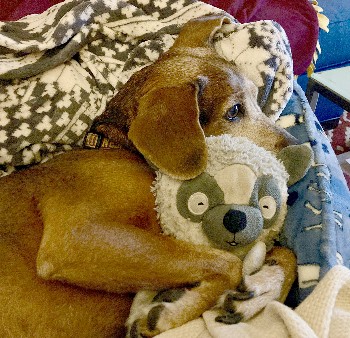Retiring from duty
Contributions of canine fecal donor Lucy put the health of dozens of dogs back on track

Contributions of canine fecal donor Lucy put the health of dozens of dogs back on track
Lucy, a beagle-mix who recently retired from serving as a fecal microbial donor, poses for a photo. Photo courtesy of Emily Coffey.
She might wear a collar instead of a cape, but an 11-year-old Beagle-mix named Lucy is a hero to more than a dozen dogs treated over the past two years at the Lewis Small Animal Hospital at the University of Minnesota College of Veterinary Medicine (CVM).
One of them is Gretl, a 1.5-year-old golden retriever whose life was saved thanks to a very special gift from Lucy: her poop.
Lucy is a now-retired fecal microbial donor. Fecal microbial transplants (FMT) use donated stool samples to restore balance to a patient’s gastrointestinal biome, which is composed of millions of microorganisms that can support operations of the body like digestion. Illnesses and medications such as antibiotics can uproot this balance and cause additional issues.
“A common reason for dogs to get antibiotics is because they have diarrhea, but dogs that have sort of waxing and waning diarrhea may end up receiving antibiotics quite frequently,” says Dr. Emily Coffey, Lucy’s owner and a PhD student in the Comparative and Molecular Biosciences program at CVM. “That’s when we worry those dogs’ microbiomes have been affected by all of those antibiotics. They've lost a lot of their happy bacteria, and there is an overgrowth of some of the bad bacteria.”

Coffey has a personal connection to the area of FMT. She is a former Lewis Small Animal Hospital internal medicine resident, which is the service that facilitates the hospital’s FMT program. When she heard the program was in need of donors, she volunteered Lucy for the role.
Lucy underwent rigorous testing, which meant sending her stool off to be analyzed and confirm she had a healthy biome ideal for donations, according to Coffey. Lucy passed the tests and met the health criteria necessary to become a donor.
During her two-year stint as a donor, Lucy’s donations helped more than a dozen dogs recover from gastrointestinal conditions. Sometimes it took one or two donations for the patient’s condition to improve. In Gretl’s case, it took four.
Gretl's medical troubles began in 2020 when she wandered too far from owners Amy and Ray Lesher at a park and took a drink from a water holding area. Not long after, she began experiencing extreme diarrhea. Even with antibiotic treatments and other care from her vet, Gretl’s symptoms continued.

“I mean it was day after day, after week after week, food in food out, food in food out. There were times that we were up eight times a night with her,” Amy Lesher says. “It was endless, just endless. She wasn't gaining weight. You could count every rib, every vertebra on this tiny little puppy.”
The Leshers were referred to the Lewis Small Animal Hospital for treatment and samples of Gretl’s feces were sent off for special tests, the results of which indicated her gut biome had been ravaged by the antibiotics that had initially kept her alive. Clinicians determined a fecal microbial transplant would be the best course of action.
Enter Lucy. Her end of the process was quite simple. Lucy did her business, Coffey collected the sample and then sent it to the hospital, where it was liquified using sterile saline and administered rectally to the awaiting patient.
While FMTs are an established medical practice for humans, Coffey says their use in veterinary medicine is still relatively new and protocols vary from practice to practice. CVM chooses to use fresh samples while other facilities have banks of frozen samples. Some practices administer the FMT by creating a pill from samples.
No matter how the FMT takes place, it isn’t viewed as a cure-all and is part of a larger treatment plan.
“FMTs are really just one tool in the toolbox,” Coffey says. “A lot of times, we have a very multimodal approach where we're using diet and probiotics and maybe other medications in some combination.”
Madison Ellis, CVT, is a familiar face during FMT procedures like Gretl’s at Lewis Small Animal Hospital. She is often the person sitting with the canine patient and holding them to ensure the sample remains internal for about 30 minutes. The procedure is straightforward, but Ellis says its impact is incredible and she enjoys supporting the patient while it takes place.

“We just talk to them and cuddle them,” Ellis says. “It's just like kind of relaxing and there's nothing negative that can come out of it besides a little bit of poop.”
When it came time for Lucy to retire due to her age, Ellis organized a party for her in December 2021, inviting owners of pets who had received an FMT using Lucy’s samples to send in well wishes and thank yous.
Amy and Ray Lesher were among those expressing their gratitude. Gretl has made steady improvements since her last transplant. The Leshers are still cautious after their experience, but they’ve watched their sick puppy bloom into a happy and sweet dog.
“We are just incredibly thankful for that service and for Lucy,” Amy Lesher says. “They saved Gretl’s life. There isn't a single doubt in my mind about that.”